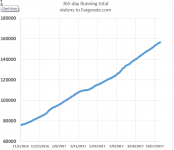Fargorate is the real deal. It is exactly like chess ELOs which have been an absolute gold standard across the game.
It won't predict if a player will choke on a certain shot.
It won't predict if they'll slop in the 9 ball when attempting a combination shot.
It won't predict if the 7 ball will skid on them.
All it does is reflect a players overall skill level based on their performance against their peers over time.
Could there be an instance in which a lower rated player is a favorite over a higher rated player? Certainly, if we had reason to believe that their performance in the future would exceed their performance in the past. This would mean that the player had IMPROVED, and as a result their fargorate would increase based on their new level of performance. For example, we knew that Can Salim was playing much stronger when he played Vilmos than his historical rating. This didn't mean Fargorate was 'wrong', it simply meant that his skill level had increased. Guess what, I'm sure his fargo rating will be on the rise as he plays at his new skill level over a number of matches.
So yes, anytime that someone improves or drops in skill level it will take time for the fargorate to reflect this. This is based on results, not reading tea leaves.
Overall Fargorate does reflect the skill someone brings to the table. If someone is rated higher than Earl, it doesn't mean that they have a backer and will put up 100K on a 10 foot table with no side pockets tomorrow. What it DOES mean is that they have historically performed better against their competition than Earl has. This is how we measure skill, because there is no way to objectively weight some racks to mean more than others.
I guess this could 'burn' someone that played very inconsistently but hit a huge high gear when they were really inspired. But again, fargorate would still reflect this overall performance. You'd just have to know the history of that player, and then it would be on you as a gambler if you wanted to bet on them catching their gear. Using the Earl example, maybe his highest gear could get there. Do you want to bet on him? I sure don't. Unless the money I was going to lose was worth the entertainment value of watching him bark at the audience every time he missed a kick shot.
The only concern for fargo is how they capture their data. If we put garbage in, we'll get garbage out. I know that I played a tournament a year ago that I won against good players and my rating didn't change. I'm guessing it was off the radar. But Mike does a remarkable job with this, particularly among top players that play major events and with league players. Technology has grown to where it's easier and easier to capture this information and fargo has grown to become more mainstream as well. I'd already give this an A, and I think this will be A+ in no time flat.
What I would like to see is an option to 'drill down' on a players rating and see the database of games they've played. For example, if I clicked on my name it would be nice to see which tournaments were included, etc. My rating has dipped in the last few months, and I'm not sure if it's because I've performed poorly lately, if I had good results from years ago that are losing weight, or if it's because fargorate is inflating as the top players continue to improve. It would be cool to better understand why I am where I am.
But as I said, this is the best thing that's ever happened to pool rankings and I'm amazed at how Mike made his vision a reality. Great job Mike. I'd give you a fargorating of 850 for coming up with rating systems, best in show. Although I'm sure Earl could've done better.

